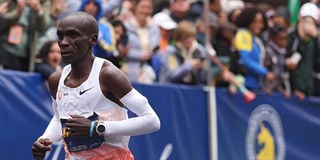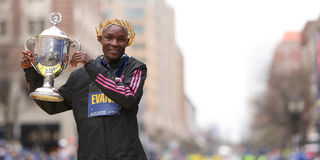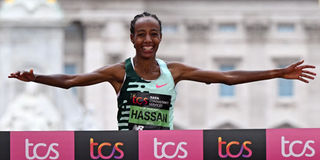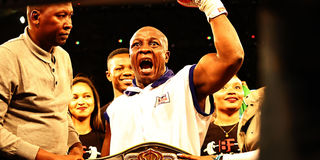Kenyan athletes need to emulate Eliud Kipchoge on and off the road

Eliud Kipchoge of Kenya runs in the professional Men's Division during the 127th Boston Marathon on April 17, 2023 in Boston, Massachusetts. Kipchoge finished in sixth place.
What you need to know:
- Getting Kipchoge out of training schedule is close to impossible, and we have to work around his training calendar for commercial engagements and appearances
- Sports is a business and just like a manufacturer producing quality goods needs a good marketing strategy so do our sports men and women
- Brigid Kosgei, the current women world marathon record holder, could have commanded acres of print and hours of TV time months before the run and even more on her early exit from the race
We can authoritatively say that Eliud Kipchoge is not only the greatest marathoner of all time, but the highest paid athlete in Kenya in recent times.
Other than prize money and appearance fees, Kipchoge has managed to cash in on endorsements locally from KBL, Total, ABSA Bank, Techno, Safaricom, Isuzu and Magical Kenya just to mention a few. Internationally he has partnerships from Nike, INEOS, Coros and Maurten based on what is available on the public domain.
He is most sought-after motivation speaker by institutions of higher learning and corporates alike. Those of us who have been privileged to work with Kipchoge in commercial engagements will testify to his discipline as far as his training program in concerned.
Getting Kipchoge out of training schedule is close to impossible, and we have to work around his training calendar for commercial engagements and appearances. And that’s what makes him a great athlete on the roads.
But this is not unique to Kipchoge, many Kenyans have achieved great exploits in the athletics, but none comes close to his earnings.
What sets Kipchoge apart? In my opinion – Marketing.
Sports is a business and just like a manufacturer producing quality goods needs a good marketing strategy so do our sports men and women.
We must celebrate the excellent performance of Kenyans at the 127th Boston marathon last week. Winning both the men’s and women’s categories is no mean achievement. In fact, I submit, that a public holiday should have been declared.
Evans Chebet, the men’s category winner, joins a very short list of athletes who have recorded successive wins in this race. Among them, Ibrahim Hussein - the first Kenyan to win the race in 1988, then consecutively in 1991 and 1992; starting a 10-year streak of Kenyan athletes’ wins at the marathon.
He was followed by Cosmas Ndeti, who made history by winning the race in three consecutive years: from 1993 to 1995 in the process earning himself an invitation to the White House.
Chebet is the first man to win two consecutive Boston Marathons since 2008 when another Kenyan, Robert Cheruiyot, won the race three times from 2006 to 2008.
Among the ladies, Catherine Ndereba won the Boston marathon four times to earn the title Catherine the Great.
In 2022, Kenyan men won all World Marathon Majors with Kipchoge and Chebet winning two each. Only a handful of runners have won two majors in a calendar year since the World Marathon Majors were established in 2006.

Evans Chebet of Kenya poses with the trophy on the finish line after winning the professional Men's Division during the 127th Boston Marathon on April 17, 2023 in Boston, Massachusetts.
Kenyans’ domination at the Boston Marathon and World majors is undisputable. But why is it that only a few of those winners remain relevant or rather continue to make news beyond the race day?
Despite Chebet’s win and his track record, a quick browse of news articles globally and chatter in my office, you can’t help but feel that his win has, to a large extent, been overshadowed by Kipchoge’s sixth place finish in the same event. Kipchoge dominated the news weeks before the event and continued to do so at the time of writing this article.
Kipchoge, plus the great performance by Hellen Obiri, has left very little airtime and ink for Evans Chebet, who is probably more than happy with his $150,000.00 take-home.
There were almost no mentions of Benson Kipruto and Albert Korir who finished third and fourth respectively. Both men can easily walk down Moi Avenue, and no one would stop them for a selfie. Kipruto won the Boston Marathon in 2021 and the Chicago Marathon in 2022. Korir, on his part, won the New York Marathon in 2021. Clearly these are big names in Marathon running.
On the back of the Boston Marathon, Kipchoge flew directly to London to be the official starter of the London Marathon while the rest of his colleagues flew directly to Nairobi and straight to Eldoret with not as much as a stopover at the Nation Centre. No airport reception no hullabaloo. No media engagements. Even for a man who just made history.
As soon as Kipchoge’s position as the starter was announced he quickly started enjoying more airtime compared to the Kenyan elite not to mention live TV space beamed at the beginning of the race giving his sponsors great visibility.
At the pre-race interviews most of our athletes went with their same old standard answer “My training has been good, I can say my training went well, and I prepared very well. I pray to God, I wake up healthy and the results will come after.”
Compare that with Sir Mo Farah’s or Sifan Hassan’s interviews.
Many observers have suggested that our athletes need to give their interviews in a more familiar language like Swahili, however I am of a different opinion. But even in Swahili why didn’t any of our athletes enroute to Boston or London get interviewed by local media weeks before their departure?

Netherlands' Sifan Hassan runs to the line to win the women's race at the finish of the 2023 London Marathon in central London on April 23, 2023.
Our top sports journalists can attest to the frustrations they encounter accessing these athletes. Hence most of the articles written do not go beyond the athlete’s performance and various races. Information you can google. However, fans demand more. They want to know their stars intimately.
During the two hours race, commentators constantly refer to the pre-event interviews giving more mentions to the athletes who have stories. The more fans know about an athlete the more they can relate and “I trained well" wouldn’t cut it.
Brigid Kosgei, the current women world marathon record holder, could have commanded acres of print and hours of TV time months before the run and even more on her early exit from the race. We all want to know why a top athlete like her would drop off within minutes of the start.
Similarly, Peres Jepchirchir who finished third at the London Marathon should have exploited her Olympic Gold medal and two previous World marathon Majors wins to command some airtime.
Kelvin Kiptum is a man with a bag of surprises. In his debut marathon he ran an amazing 2:01:53 In Valencia in 2022. and broke the London course record previous held by Kipchoge (2:02:37 in 2019). He ran all time second fastest time of 2:01:25, 16 seconds slower than the world record.
He is also the only athlete among those who participated in Boston or London to grant a pre-event interview locally. The article by Ayumba Ayodi, might be the only information that was available to commentators and the global media who were busy googling to find anything about the new London marathon champion.

Kelvin Kiptum speaks to journalists after winning the men's London Marathon on April 23,2 023.
Sir Mo Farah, despite finishing ninth enjoying home ground advantage and years of success on the track took the lion's share in media space. He had a story, it was well covered before the race, and hence easy for commentators to build on.
You will remember in 2017 Usain Bolt gave more than 40 interviews before his final 100m race at the World Championships, little is remembered of the fact that he didn’t finish that 100m dash.
Hype doesn’t require one to win but hype adds dollars to the bank account.
The King of pre-event hype has to be one "Mtu Kazi" Karim Mandonga who single-handedly sold out tickets to otherwise what would have been a poorly attended event.
He even made an appearance at the Kili Marathon in Moshi running a decent half marathon. As boxing promoters would you consider paying "Mtu Kazi" a sizable appearance fee? Sounds like a good investment.

Tanzania's Karim Mandonga celebrates after winning the vacant regional Pugilistic Syndicate of Tanzania (PST) light heavyweight title on March 25, 2023 at Kasarani indoor gymnasium.
Many athletes despite their great accomplishment on the track/road fail to transcend to stardom and lose opportunities to continue earning beyond the race day.
Few Kenyans will remember Robert Cheruiyot despite his three consecutive wins at Boston, or Naftali Temu, the first Kenyan to win an Olympic gold medal, yet all of us know and remember the second Kenyan to win a gold medal: Kipchoge Keino.
Even less is remembered of Dennis Kimetto who broke the Marathon World Record as recent as 2014 after three consecutive World Marathon Major wins.
At a recent athletes’ workshop, none of the attendees drawn from our current Team Kenya, could recognize a photo of either Kimetto or Temu.
This is not unique to marathons nor is it unique to Kenyan athletes. At any golf championship that Tiger Woods participates, the winner easily gets overshadowed by Tiger’s presence. Lewis Hamilton has the same effect at F1 events.
While the prize is money is good, many champions leave money on the table by failing to tap into the millions available to Stars from endorsements. Corporate sponsors are more interested in stars as opposed to champions. They are interested in those who can command media and the public’s attention both off and on the running track.
Prize money is great. However, commercial endorsements have been known to surpass the former.
In 2021, tennis star Roger Federer, by Forbes count, was reported to have earnings of $90.6 million with less $1 million from actual tennis. In the same year, Conor McGregor, earned $22 million from endorsements and just $8 million from prize money. Similarly, tennis player Naomi Osaka earned $55.2 million in endorsements and $5.2 million in prize money.
As evidenced in this Boston Marathon, Kipchoge was able to hold media to almost 15 minutes interview not to mention the well drafted posts on his social media handles before and after the race. It's no wonder according to Google trends, more than 100 times more people searched Eliud Kipchoge compared to Evans Chebet in the past 14 days.
Sports federations, clubs and managers need to incorporate media and other soft skills training in the robust programs for our athletes. Especially given the short window available for athletes to make a living.
A professional athlete’s preparation does not end at his/her performance training. A good portion of their time must be allocated to building their brands otherwise we shall continue to witness men and women who carried our flag high live in poverty after their retirement.
Peter Gacheru is the CEO at IMG marketing company.




